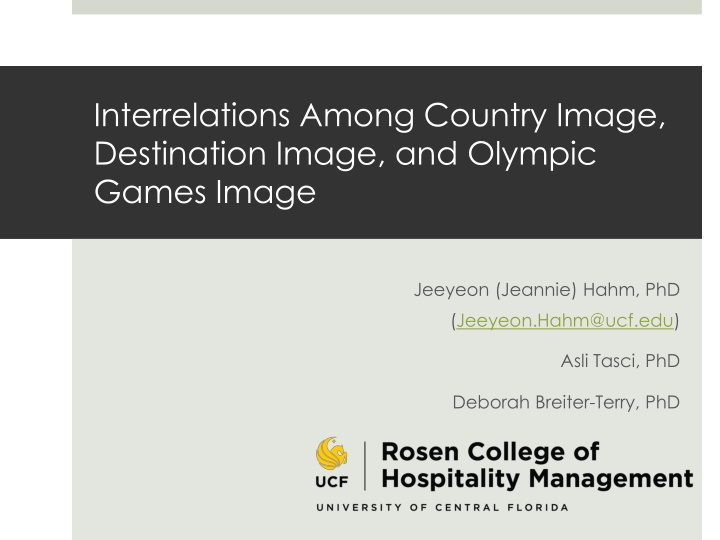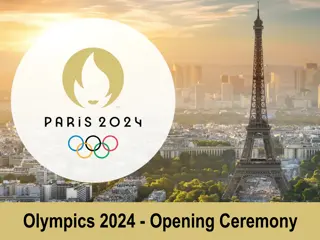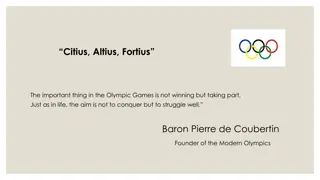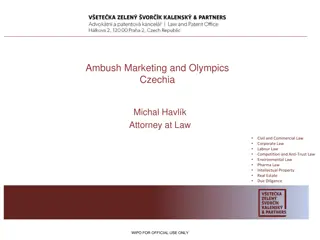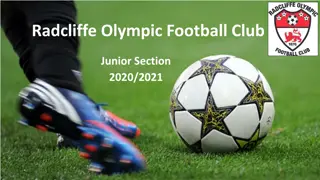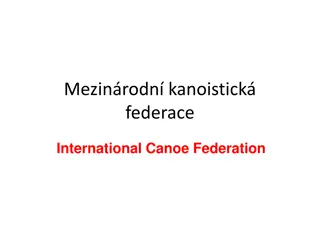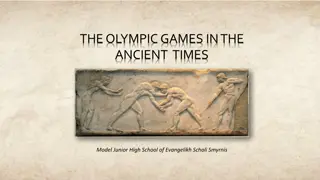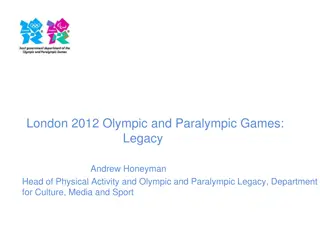Interrelations Among Country, Destination, and Olympic Games Images
This research explores the interconnectedness of country image, destination image, and Olympic Games image to identify beneficiaries and benefactors in these complex relationships. It aims to understand how these images influence each other and future visit intentions. The study utilizes a conceptual framework to analyze the mutual relations among these constructs and conducts a literature review to establish the importance of these images in the context of sport tourism. Methodology involves a survey to measure country image, destination image, and Olympic Games image using Likert scales.
Download Presentation

Please find below an Image/Link to download the presentation.
The content on the website is provided AS IS for your information and personal use only. It may not be sold, licensed, or shared on other websites without obtaining consent from the author.If you encounter any issues during the download, it is possible that the publisher has removed the file from their server.
You are allowed to download the files provided on this website for personal or commercial use, subject to the condition that they are used lawfully. All files are the property of their respective owners.
The content on the website is provided AS IS for your information and personal use only. It may not be sold, licensed, or shared on other websites without obtaining consent from the author.
E N D
Presentation Transcript
Interrelations Among Country Image, Destination Image, and Olympic Games Image Jeeyeon (Jeannie) Hahm, PhD (Jeeyeon.Hahm@ucf.edu) Asli Tasci, PhD Deborah Breiter-Terry, PhD
Background of Study Sport events receive increasing attention from destination marketing and management organizations due to their influence on enhancing destination image and the potential behavioral consequence of future visit intentions (Chalip, Green, & Hill, 2003; Chalip & McGuirty, 2004; Jago, Chalip, Brown, Mules, & Shameen, 2003). The goal of this research is to identify the triangular relations among country image, destination image, and mega event image, specifically the Olympic Games image in order to identify the benefactors and beneficiaries in these complex relationships.
Conceptual Framework Based on the past literature, mutual relations among all constructs are assumed. Country Image Since no study has measured all three images together, these assumptions and the strength of the relations among the constructs will be defined in the current study. Destination Image Olympic Games Image This study will be the first to measure the image of a mega event in different destination image contexts and different country settings.
Literature Review Country image and destination image are thought to be interrelated, due to the influence of the former on the perceptions of products of that country, including tourism products Although there are negative perceptions of a country (especially developing nations) from an economic, political, and social perspective (i.e., country image), the country may be positively perceived from a tourism point of view (i.e., destination image) Strong image of a destination may influence a sport tourist s decision to attend an event A successful mega event, such as the Olympic Games may in turn contribute to the image improvement of a destination Sport event image in relation to destination image is postulated to involve cognitive and affective perceptions related to emotional, organizational, environmental, physical, and social aspects that are permeated by common and unique attributes No previous studies examined whether the general country of origin image or the destination image is a more relevant construct to measure in the context of a popular and well-established mega event Alvarez & Korzay, 2008; Echtner, 2002; Kaplanidou, 2010; Kaplanidou & Vogt, 2007; Martin & Eroglu, 1993; Nadeau, Heslop, O Reilly, & Luk, 2008; Ozturkmen, 2005
Methodology: Survey Instrument 7-point Likert scales (1 = Extremely Poor, 7 = Excellent) to measure: Country Image (9 items) Destination Image (13 items) Olympic Games Image (10 items) 7-point Likert scales (1 = Extremely Unimportant, 7 = Extremely Important) to measure: Importance of Information Sources for Destination Image (6 items) Importance of Information Sources for Olympic Games Image (6 items) Past Experience with the Country and the Olympic Games Familiarity with and Interest in the Olympic Games Sociodemographic Questions
Methodology: Sampling Frame & Data Collection Quasi-experimental study design Four groups of different countries that hosted the Olympic Games in recent years: Greece (motherland of the Olympic Games) Brazil Russia England Online data collection Amazon s Mechanical Turk Participants that consented to the survey were randomly assigned to one of the four groups 390 usable samples (out of a total of 422 collected) Data Analysis: Descriptive statistics, frequencies, chi-square test, correlations, t-tests, and ANOVA
Results Past Experience and Interest Small percentage have attended the Games before (2-8%) Less than a quarter are interested in attending (18- 25%) Majority follow the Games on media (60-71%) Some are familiar with the Games but not follow (30-39%) Small percentage are not interested at all (0-6%) The #1 country that comes to mind when thinking of the Games are: 1. USA 2. Greece 3. Brazil Important Information Sources Majority had no prior visit to the countries (lowest rated) For England and Greece, word-of-mouth was rated highest For Brazil and Russia, printed or online news media was rated highest On average, TV programs and printed/online news media were top rated information courses in all groups
Results (cont.) Country Image Destination Image England rated highest on country image on all of the items Overall, Greece rated the highest In general, Greece and Brazil rated better on destination image than country image Overall, Brazil rated the lowest England and Greece rated top on England rated highest on amount of cultural/heritage attractions (6.06) standard of living (5.72 and 4.47) attention to societal well-being (5.70 and 4.54) England lost its top rating on most items of destination image Brazil rated highest on diversity of cultural make up (4.58) but lowest on education system and political stability Greece and Brazil rated highest on scenic beauty (6.06 and 5.88) Russia rated highest on uniqueness of culture/customs (5.22) Russia rated top on technological development (4.13) but lowest on diversity of cultural make up In general, Russia was the lowest rated destination
Results (cont.) Olympic Games Image Interrelationships Spectacle of ceremonies was rated the highest in all groups Positive relationship among country image, destination image, and Olympic Games image When country image is high, so is destination image and Olympic Games image, and vice versa Environmentally friendly practices of the Olympic Games was rated the lowest across all groups Olympic Games image was strongest when compared to average of all countries country image and destination image Overall, Greece rated the highest and Brazil rated the lowest Olympic Games image was significantly better than the country image but similar to the destination image of Greece and Brazil The strength and stability of the Olympic Games image was evident England is the only destination with both country image and destination image being fit with the Olympic Games image
References Alvarez, M. D. & Korzay, M. (2008). Influence of politics and media in the perceptions of Turkey as a tourism destination. Tourism Review, 63(2), 38-46. Chalip, L., Green, B.C., & Hill, B. (2003). Effects of sport event media on destination image and intention to visit. Journal of Sport Management, 17(3), 214-234. Chalip, L. & McGuirty, J. (2004). Building sport events with the host destination. Journal of Sport Tourism, 9(3), 267-282. Echtner, C. M. (2002). The content of third world tourism marketing: A 4A approach. International Journal of Tourism Research, 4(6), 413-434. Jago, L., Chalip, L., Brown, G., Mules, T., & Shameen, A. (2003). Building events into destination branding: Insights from experts. Event Management, 8(1), 3-14. Kaplanidou, K. (2010). Active sport tourists: Sport event image considerations. Tourism Analysis, 15, 381-386. Kaplanidou, K. & Vogt, C. (2007). The interrelationship between sport event and destination image and sport tourists behaviors. Journal of Sport & Tourism, 12(3-4), 183-206. Martin, I. M. & Eroglu, S. (1993). Measuring a multi-dimensional contract: Country image. Journal of Business Research, 28(3), 191-210. Mart nez, S. C., & Alvarez, M. D. (2010). Country Versus Destination Image in a Developing Country. Journal of Travel & Tourism Marketing, 27(7), 748 764. Nadeau, J., Heslop, L., O Reilly, N., & Luk, P. (2008). Destination in a country image context. Annals of Tourism Research, 35(1), 84 106. Ozturkmen, A. (2005). Turkish tourism at the door of Europe: Perceptions of image in historical and contemporary perspectives. Middle Eastern Studies, 41(4), 605-621.
